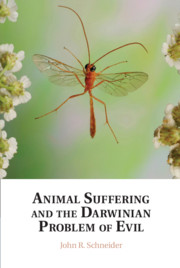Book contents
- Animal Suffering and the Darwinian Problem of Evil
- Animal Suffering and the Darwinian Problem of Evil
- Copyright page
- Dedication
- Contents
- Foreword
- Acknowledgments
- Introduction
- 1 Facing the Darwinian Problem of Evil
- 2 Darwinian Evil and Anti-Theistic Arguments
- 3 Ways around the Problem
- 4 Making a “Case for God” (a Causa Dei)
- 5 Animal Suffering and the Fall
- 6 Narrow Is the Way of World Making
- 7 God-Justifying Beauty
- 8 Suffering “For No Reason”
- 9 Darwinian Kenōsis and “Divine Selection”
- 10 Animals in Heaven
- Bibliography
- Index
9 - Darwinian Kenōsis and “Divine Selection”
Published online by Cambridge University Press: 17 March 2020
- Animal Suffering and the Darwinian Problem of Evil
- Animal Suffering and the Darwinian Problem of Evil
- Copyright page
- Dedication
- Contents
- Foreword
- Acknowledgments
- Introduction
- 1 Facing the Darwinian Problem of Evil
- 2 Darwinian Evil and Anti-Theistic Arguments
- 3 Ways around the Problem
- 4 Making a “Case for God” (a Causa Dei)
- 5 Animal Suffering and the Fall
- 6 Narrow Is the Way of World Making
- 7 God-Justifying Beauty
- 8 Suffering “For No Reason”
- 9 Darwinian Kenōsis and “Divine Selection”
- 10 Animals in Heaven
- Bibliography
- Index
Summary
This chapter includes a defense of Rolston’s thesis that Darwinian evolution is “cruciform” or “kenotic” in character, i.e., that the self-sacrificial role of animals in nature is strongly analogous to the part played by Jesus Christ in redeeming the world. With Southgate, the author rejects Rolston’s conclusion, however, that the moral goodness of this “cruciformity” outweighs and justifies evolutionary suffering. The Darwinian kenōsis (the author’s phrase) has partial God-justifying force, but for full justification an eschatological sequel is required. The comparison strengthens the position of theism in the controversy on both the evidential and justificatory levels of the Darwinian problem of animal suffering. The author also argues that Paul’s famous digression on divine election in Romans 8-11 provides unexpected help on all these levels. It supports the aesthetic analogue of God as Artist, and the imagery helps to sharpen the thesis taken from Job: God is creating the messianic Cosmos by extraordinary artistic-moral means. In the emergence of the Church from the cross, we can already begin to “see” the truth of this proclamation.
- Type
- Chapter
- Information
- Animal Suffering and the Darwinian Problem of Evil , pp. 201 - 218Publisher: Cambridge University PressPrint publication year: 2020

